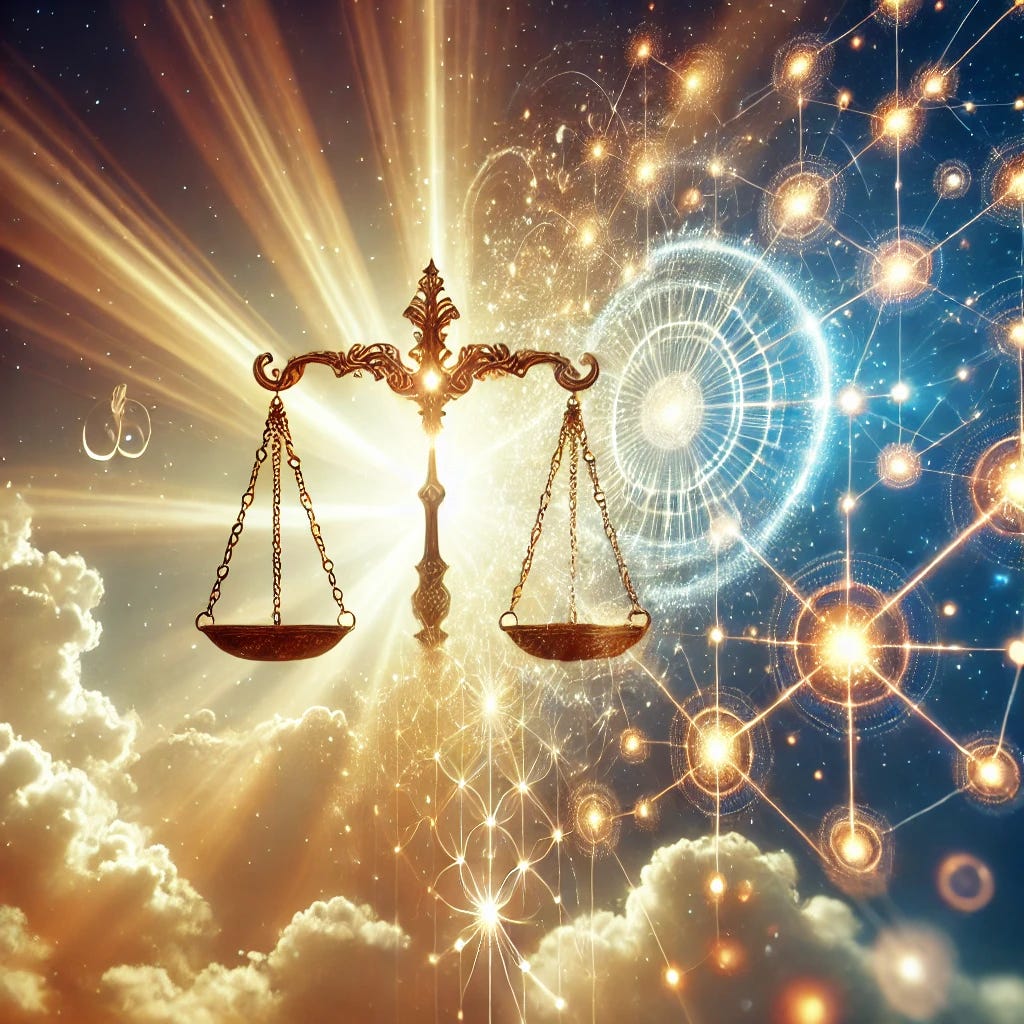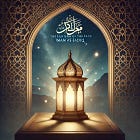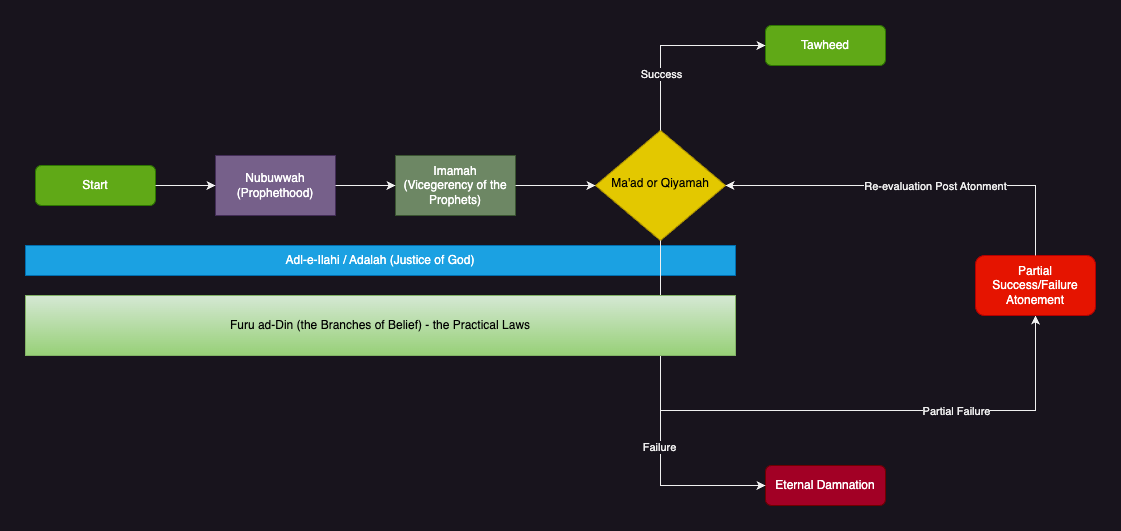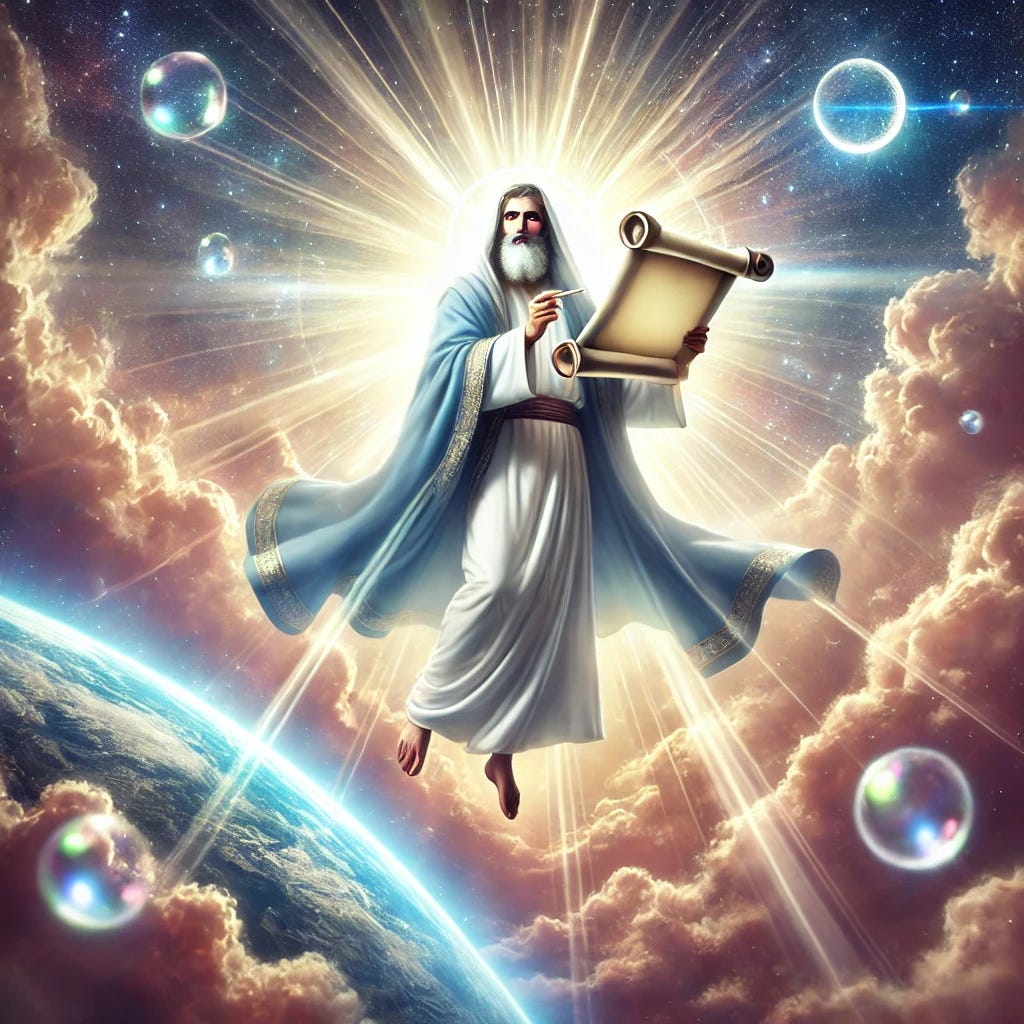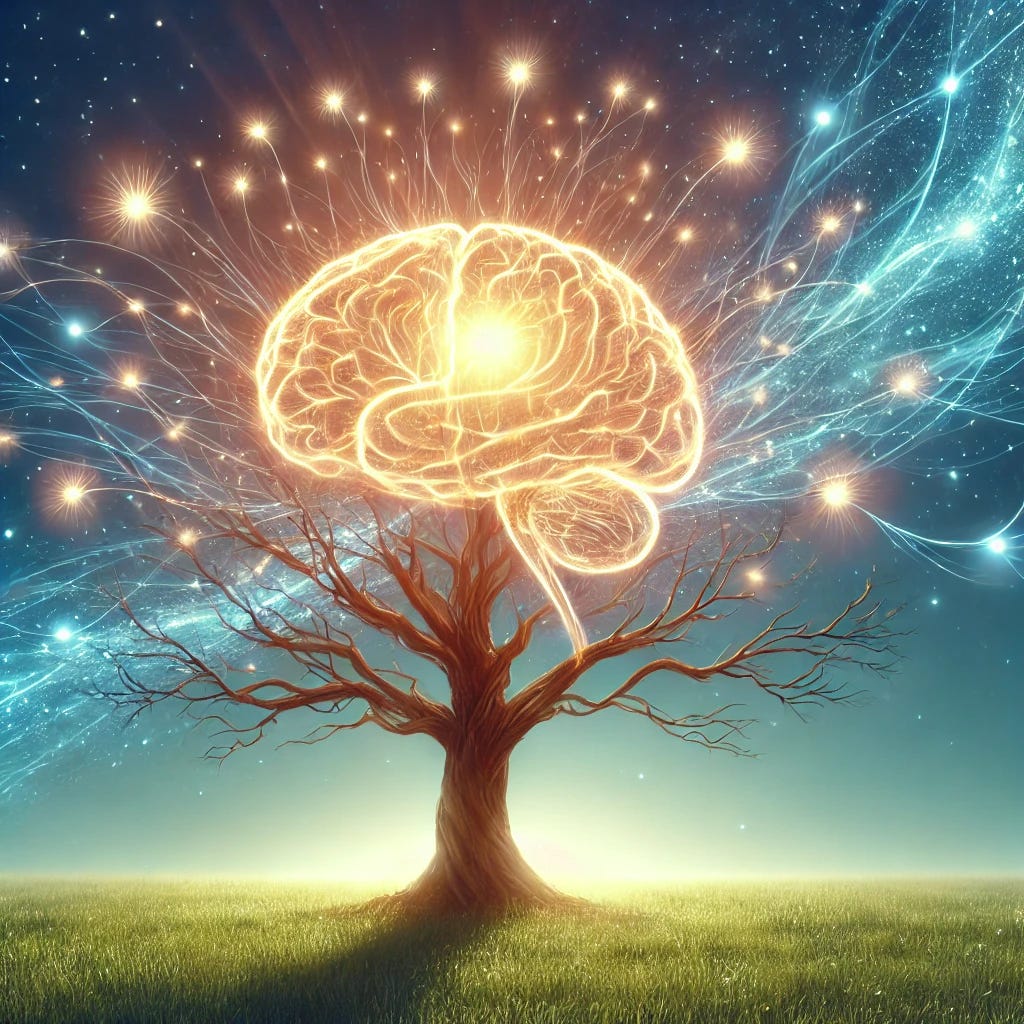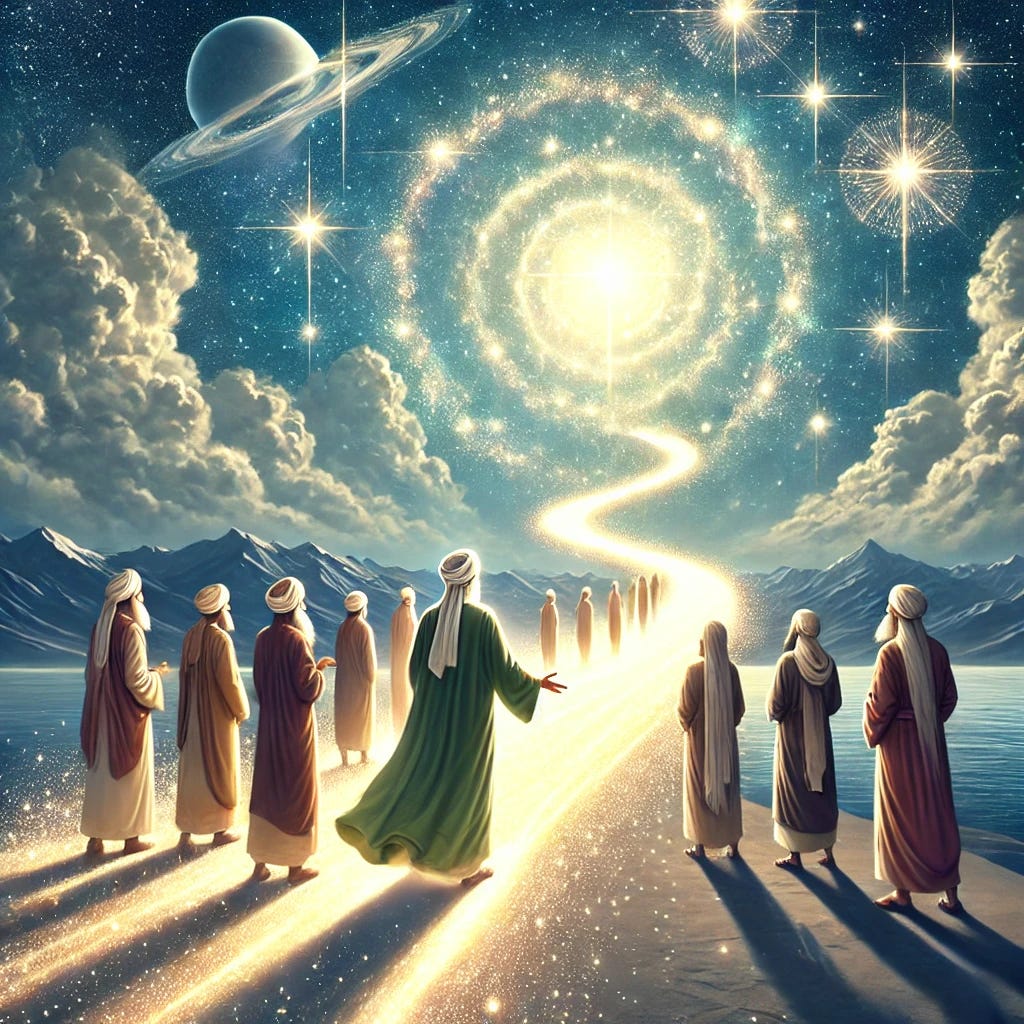[6] Prophethood - The Philosophy of Prophethood
A series of discussions on the teachings of Imam Sadiq (sixth Imam of the Muslims), from the book Misbah ash-Sharia (The Lantern of the Path)
In His Name, the Most High
This is part six of an ongoing series of discussions on the book by Imam as-Sadiq titled ‘Misbah ash-Sharia’ (the Lantern of the Path).
It is strongly recommended that the previous parts are read, before proceeding with this one; to avoid any confusion or misunderstanding within the subject matter.
The nature of the subject matter, and the style of discourse requires that each part build upon those that came before it, so once more, I strongly recommend that the reader, read the previous parts, and then continue with this one.
The previous parts, can be found here:
Video of the Majlis (Sermon/Lecture)
This write up is a companion to the video majlis (sermon/lecture) found below:
Contents
Majlis: Misbah ash-Sharia - Servitude - Part 6
Nasheed: Ya Mahdina (Oh Our Mahdi) - Kawthar Nazar al-Qatari with English subtitles
Munajaat: Munajaat Imam Ali
Recap
Over the last couple of sessions, we have covered in a somewhat simplified manner, the subjects of Tawheed (Unity/Uniqueness of God or Monotheism) and Adalah (The Justice of God).
We learned some important key points of each of these subjects; with one of the most important points being that God’s attributes or qualities are not separate from His Essence or from each other.
Furthermore, we learned that as per our approach of using a more holistic understanding of the ideology of Islam as per our diagram (shown below), that the remaining points of the Usul ad-Din (Foundations of Belief) are within the umbrella of Adalah (the Justice of God), as they are essentially manifestations of the Justice of God - and since His attributes are also not separate from each other, or from His essence, one can also posit that these two points - that will be covered in coming sessions - are also manifestations of His other attributes also - including His Compassion, Mercy, Wisdom and His profound Love for all His creation.
Based on this understanding that we have garnered over the past few sessions; we can now start to look at the very important concept of Nubuwwah, or prophethood.
Nubuwwah (Prophethood) - Part 1
Introduction
This is a notion that needs a great deal of reflection and understanding; and while some might assume that this is ‘just God sending prophets to humanity’ - it behoves us to understand what prophethood actually is; and what is the reason, the philosophy one might say, of prophethood in and of itself.
It is also important for us to understand, that the concept of prophethood is not unique to Islam, but that rather it is something which is part and parcel of every divine system, of every religion.
One might even say, that belief without any kind of prophethood, would become meaningless.
We know - based on our previous discussions - that religion by definition is a program, a pathway, a school of thought, that is based on a message from God. This by its very definition, requires that there is a messenger appointed by God, that delivers such a message - which is from God - in the first place.
Nubuwwah, or prophethood, is therefore a core component of religion, and indeed, it can be argued that prophethood, and the message of prophethood is what makes the religion, the ideology, what it actually is.
In this and the next few sessions; we will examine the concept of Nubuwwah in some detail, so that we can understand what it actually is, what the position of the Prophets of God are; why God chose to send them; where He sent them and many such concepts.
It should be noted that since the subject of prophethood is a vast subject; this subject is unlikely to be covered in one session; therefore, this subject will be covered in a number of sessions, starting with this one.
One important point; much of what will be discussed on this subject of prophethood is from the teachings of Imam Khamenei in a series of lectures he had delivered during the month of Ramadhan, in the mid 1970s, prior to the victory of the Islamic Revolution.
So, let us proceed, in the Name of the One who sent prophets to every nation, that they might be guided towards His most Beautiful Face.
What is Prophethood
In the previous sessions we have discussed, that, prophethood can be thought of as a manifestation of the Justice of God, the Mercy of God even, and as a result; it is a system that is designed to help us reach our ultimate goal of Tawheed, and to be successful in navigating the destination of our journey (that leads to our goal), which is Ma’ad or Qiyamah (The Day of Judgement).
هُوَ الَّذِي بَعَثَ فِي الْأُمِّيِّينَ رَسُولًا مِّنْهُمْ يَتْلُو عَلَيْهِمْ آيَاتِهِ وَيُزَكِّيهِمْ وَيُعَلِّمُهُمُ الْكِتَابَ وَالْحِكْمَةَ وَإِن كَانُوا مِن قَبْلُ لَفِي ضَلَالٍ مُّبِينٍ
وَآخَرِينَ مِنْهُمْ لَمَّا يَلْحَقُوا بِهِمْ ۚ وَهُوَ الْعَزِيزُ الْحَكِيمُIt is He who sent among the unlettered a messenger from themselves; reciting His revelations to them, and purifying them, and teaching them the Scripture and wisdom; although they were in obvious error before that.
And others from them, who have not yet joined them. He is the Glorious, the Wise.- Quran, Surah Jumu’ah (the Chapter of Friday) #62, Verses 2 to 3
When talking about prophethood, we can talk about the extent to which the prophet is a possessor of divine knowledge, or of secular learning. We might want to discuss whether the Prophet of Islam was able to read or write as per the verse:
وَمَا كُنتَ تَتْلُو مِن قَبْلِهِ مِن كِتَابٍ وَلَا تَخُطُّهُ بِيَمِينِكَ ۖ إِذًا لَّارْتَابَ الْمُبْطِلُونَ
You did not read any scripture before this, nor did you write it down with your right hand; otherwise the falsifiers would have doubted.
- Quran, Surah al-Ankabut (the Chapter of the Spider) #29, Verse 48
Looking at the verse, when the verse says that the Prophet ‘did not read any scripture, nor write it down’, was this because he lacked the ability to do so? In other words, was this because he was illiterate by the standards we hold today? Or not? Could it be that he was able to read and write but simply chose to not do so? This is yet another discussion.
Alternatively, we might ask what was the religion of the Prophet before he was chosen as a prophet of God?
Yes, these are all questions that we could ask if we wanted to. However, which of these, if any, are actually necessary for us to know?
The answer is of course none of them, not a single one of them.
Certainly, once someone knows everything about the prophethood and religion, there can be an academic discussion posing such questions.
However, at this stage, when we know so little, when our society and communities have yet to grasp the most basic meaning of prophethood, of someone being sent a message from God, of the purpose of sending messengers in the first place, and of the way in which prophecy and prophethood function, how necessary are such academic discussions?
Most, if not all Muslims, don’t know the purpose of Prophet Muhammad’s mission, or what he was sent to accomplish, and this is one of the key causes for the current state of the Muslims in our time.
Indeed, if we had truly grasped what his mission was, we would be pursuing it now.
Therefore, when we are ignorant of the fundamentals of prophethood, of the basics of prophethood, what use is there in going into such secondary issues or trying to answer academic questions about it?
This is why, we will not be looking at prophethood in the traditional way, rather we will be examining prophethood as it has been discussed by Imam Khamenei and others from the senior scholars, in a way that is actually useful and more importantly, necessary.
Therefore, this series of discussions will not - and indeed has not - used the traditional approach in discussing this - and indeed the previous or forthcoming - subjects.
The Philosophy of Prophethood
The first issue we have to look at, to examine with regard to prophethood, is the philosophy of prophethood. Why should we have prophets? Why should God appoint someone to guide other human beings? Can the human being not guide himself? Is not human knowledge and learning up to the task? What use is a prophet? Why do we need someone to bring us knowledge of the unseen?
These are the questions that we need to first address, since, if we do not know or understand the philosophy of prophethood, the philosophy behind prophecy, then all of the other topics we can discuss with regard to prophethood will lack a sound and robust foundation. Without a strong foundation; they can easily be damaged and broken - which will lead to all manner of confusions and problems.
Therefore; while I had intended to cover prophethood in one session, I believe that will not be possible, as there are a number of questions, a number of issues that must be discussed.
The first issue, the first question, that we must answer is ‘what is prophethood for?’ What is it’s purpose?
So firstly, we have the short answer; and then we can dive into some more detail and get a more comprehensive understanding.
To put it simply, the human being’s innate senses, instincts and intellect are not sufficient by themselves to guide him to the goal.
There are, however, creatures for whom their senses are sufficient. There are living beings that only need their outward senses to fulfil their purpose in life.
The Honey Bee and Instinctive Revelation
There are also other animals who, as well as their outward senses, have been endowed with instincts to guide them - for example the common honey bee. The honey bee has instincts that tell them - or maybe we can say guide them - to visit flowers, to collect nectar to bring it back and store it in the hexagonal cells according to a certain arrangement.
The hexagonal cells are made by the queen of the honey bees, which is also something that the queen bee does instinctively, she knows how to make these cells, where to put them, and where to ensure that the nectar is stored. Indeed, the queen and the guards perform their own specific duties with regard to the nest.
How do the bees know how to do this? Did all the hives of the world send representatives to a World Bees Congress to decide how they should construct their hives? Did they debate the merits of whether each cell should be triangle, square, octagonal or hexagonal and such? Did the bees go out and perform scientific studies, did they draw up proposals and white papers or policy papers for this? Did they then decide they should have a plebiscite - a referendum - for the final decision?
Not at all, they are just following their God given instincts, just as their Creator intended, this is clearly stated in the Quran:
وَأَوْحَىٰ رَبُّكَ إِلَى النَّحْلِ أَنِ اتَّخِذِي مِنَ الْجِبَالِ بُيُوتًا وَمِنَ الشَّجَرِ وَمِمَّا يَعْرِشُونَ
ثُمَّ كُلِي مِن كُلِّ الثَّمَرَاتِ فَاسْلُكِي سُبُلَ رَبِّكِ ذُلُلًا ۚ يَخْرُجُ مِن بُطُونِهَا شَرَابٌ مُّخْتَلِفٌ أَلْوَانُهُ فِيهِ شِفَاءٌ لِّلنَّاسِ ۗ إِنَّ فِي ذَٰلِكَ لَآيَةً لِّقَوْمٍ يَتَفَكَّرُونَAnd your Lord inspired the bee: “Set up hives in the mountains, and in the trees, and in what they construct.”
Then eat of all the fruits, and go along the pathways of your Lord, with precision. From their bellies emerges a fluid of diverse colours, containing healing for the people. Surely in this is a sign for people who reflect.- Quran, Surah an-Nahl (the Chapter of the Bee) #16, Verses 68-69
Indeed, what is described in these verses, can be considered God’s revelation to the bees - a different type of revelation, not in the sense that the bees were sitting and waiting for Gabriel to descend with God’s message, but rather as an instinctive revelation, whereby God endowed them with this instinctive knowledge on building and maintaining a hive, how and where to gather nectar from and how to live together in their communities.
This is instinctive; this means that the bees have no say in the matter - their instinct drives them to live and operate in this way. It is their innate nature to build their homes in this specific form, in specific locations, and to seek out specific types of flowers from where they can gather the nectar.
If a bee did not follow their nature, and began going to poisonous plants instead - for example - the other bees would prevent that bee from returning to the hive. Therefore, the bee, or rather bees, live entirely in accordance with their instincts.
Instinct is, therefore, sufficient for the bees.
The Belgian author, Maurice Maeterlinck, spent years studying and reflecting on the lives of bees, ants and termites. He wrote multiple books about them.
No-one is happy to find termites in their homes, but these termites do amazing things. They build their nests in a particular form, a particular arrangement; and indeed, this form has remained largely constant and unchanged since prehistory.
If a person went and studied an ancient beehive, or termite mound, and compared it to one from today, you would see that nothing has changed.
There is no spiritual or intellectual progression amongst honey bees, termites and such creatures.
Whatever receives revelation through its own nature, whatever is guided by its instincts, whatever is led by the form in which they were created, will perform its function to the best of it’s ability, as long as nothing prevents it from doing so. Therefore, it has nothing but instinct.
The Human Being - Beyond the Instinctive
Human beings also have instincts upon which they rely. But the reliance on their instincts is far less than that of the honey bee.
When we are born into the world, we are very much like these honey bees, we are driven by instinct to, for example, suckle at our mother’s breast for sustenance and nourishment. No infant is taught how to suckle at the breast, this is entirely instinctive.
However, when we reach the age of childhood, as well as beyond childhood, this tool known as instinct becomes weaker and less useful. At the same time, we develop something far more powerful and influential, and this is called intellect.
Intellect, takes the place of instinct and allows us to learn.
For example, it is not instinct that tells someone to goto work at a certain time of the day, to speak to his or her customers in a particular way, for a student to study in a particular manner, or for a teacher to teach in a particular manner.
These are not instinctive. These are things we learn through the use of our intellect. Our intellect enables us to learn how to live in this world in a variety of ways.
Is the Intellect Enough?
Now, an important question that must be raised here, is whether this intellect is sufficient, whether this human capacity for learning, or thought, is this enough by itself to guide one to happiness?
Can the intellect alone be enough to guide humanity?
Well, what does intellect itself say about this? If it thinks, without prejudice, without bias, it will say no. Just like a judge might have to recuse himself from a given case, the sound and impartial mind, might say that it is unable to guide humanity independently.
Evidence for this, if required, can be found in many places; but two arguments to explain this can be posited.
The First Argument
The first argument for this is that the human intellect is limited and finite, whereas the human need is unlimited and infinite. How then, can a finite intellect comprehend the infinite needs in order to fulfil them properly, let alone provide a system of laws and guidelines to regulate them?
The human intellect cannot accomplish this. It is simply, not strong enough, it is not capable enough, it is not mature enough, to fully comprehend all the trials and tribulations, pain and suffering of the human experience, let alone find cures and solutions for all of them.
The Second Argument
The second argument is that if we examine history and science, does it seem that the intellect is capable of achieving this goal that we seek for it? Did lofty intellects such as Aristotle, Plato and Socrates suffice to guide humanity?
Plato was a great thinker. He would ponder, reflect, study and discuss. One result of his thinking, his philosophising, was that he devised the ‘perfect image of society’ - the Republic - but this society cannot exist, beyond the confines of his own mind.
It was impossible to put into practice. If you go and study Plato’s Republic today, you would see that it would be an unacceptable, farcical and inept thing, if it were to be implemented today.
Indeed, even thinkers of the modern age, such as those of the 20th and 21st Century CE, for example, Karl Popper, Richard Kraut, Mellissa Lane and others; who have spent years studying Plato’s works have concluded Plato’s notion of The Republic is more a philosophical thought experiment, rather than a practical blueprint for governance.
It may provide a framework for discussing things like justice and societal organisation, however it is fundamentally incompatible with the complexities of human nature and such ideas.
So we can see, how different philosophical and intellectual schools confront each other. As long as humanity does not have a connection to a higher power or higher principle, it cannot find happiness and contentment.
This is the meaning of Prophethood.
The Meaning of Prophethood - Intellect Led By Revelation
The human being needs a higher power to provide him with a deeper and more profound type of guidance than the guidance that can be derived using the senses, instinct or even rational reasoning and thought.
But how would such guidance work? Would it compete or conflict with our senses? Would it be counter to our instincts? Would it reject the intellect?
Of course not. Far from it. Rather this guidance is there to direct our intellect, to nurture and train it, to cleanse it, unearth it and bring it into the light.
Imam Ali - the first Imam of the Muslims - the Commander of the Faithful, was not only the Commander of the Faithful, but he was also the teacher of humanity. In Nahjul Balagha - in the first Sermon - he says that God sent the prophets in order to call humanity to maintain the pact of their innate nature (their fitrah), to remind them of the divine blessings they had forgotten, and to unearth the buried treasures of their intellects for them.
The prophets came to unearth the human minds, intellects and understandings, senses and societies which had been buried under tyrants, such as Nimrud and Pharaoh.
Pharaoh did not want people to use their intellects, he did not want them to think for themselves. Modern-day pharaohs use this exact same approach of preventing or discouraging people from thinking for themselves; but rather ensure their ‘priests’ and ‘magicians’ keep the people pre-occupied with a constant stream of mind numbing stupidity.
Pharaoh and his ilk, knew that if the people thought for themselves - that is used their intellect - then their reign would be at an end. The same is the case in our times. Pharaoh didn’t want people to use their minds, so he tried to bury them. How did he bury them? We will discuss this in more detail in future sessions on this subject of Prophethood, God willing.
In any case, the prophets came to unearth these buried treasures, to remove the dust from them, and to return them to their rightful owners.
The prophets were not given the power of revelation in order to oppose or fight with the intellect. Those who suggest that religion is in conflict with reason, understand neither reason, nor do they understand religion.
Someone who has an active mind, a person who uses their mind and has studied religion, will know for sure that religion has no conflict with human reason or learning, and indeed never will.
What religion teaches, what religion says, is understood by a sound intellect.
There are ignorant people, who, in the name of ‘defending religion’ say things like:
“You shouldn’t ask ‘why’ about religion”
or
“You shouldn’t ask for proofs in religion”
or
“You shouldn’t bring philosophy into religion”
They are of the opinion that using ones reason diminishes religion. But they must learn that this is not the case at all. When true religion is placed alongside a complete intellect, you will find that neither one has any conflict or contradiction with the other.
Today, great human minds understand the meaning of Tawheed (Unity, Uniqueness of God), of Nubuwwah (Prophethood), of prayer, of fasting, of charity and of all the other rulings and principles of religion.
For example, it is through our scientific research and collective experiences as human beings, that we have come to understand the many harms that alcohol has on the human body, on the human mind, and on human society as a whole.
So why should we be shy to recite aloud the verse of Quran from the Chapter of the Table spread (al-Maidah), that reads:
يَا أَيُّهَا الَّذِينَ آمَنُوا إِنَّمَا الْخَمْرُ وَالْمَيْسِرُ وَالْأَنصَابُ وَالْأَزْلَامُ رِجْسٌ مِّنْ عَمَلِ الشَّيْطَانِ فَاجْتَنِبُوهُ لَعَلَّكُمْ تُفْلِحُونَ
O you who believe! Intoxicants, gambling, idolatry, and divination are abominations of Satan’s doing. Avoid them, so that you may prosper.
- Quran, Surah al-Maidah (the Chapter of the Table Spread) #5, Verse 90
Why don’t we mention this verse of the Quran? Why don’t we argue on the basis of what human understanding has grasped in their field? Why don’t we say that this is the work of Satan - meaning those satans who give this to you, those satans who consume it? Why don’t we raise our voices, knowing all that we do on this?
Now, someone might argue against this, by using the saying of Imam Sajjad - the fourth Imam of the Muslims:
“God’s religion is not found through the intellects”
- Al-Hayat al-Siyasiyah lil-Imam as- Sajjad (The Political Life of Imam Sajjad), By Allamah Baqir Sharif Qurashi
However, this means something else entirely in actuality. This means that God’s religion cannot be discovered through intellectual processes.
What does this mean?
Consider, if we did not have a narration telling you that the dhuhr (noon) prayer consisted of four rak’ah (units), we could not - by way of reason alone - deduce that this prayer consisted of four units.
If the Quran did not tell us the times of the prayers, then we could not - using only our minds and intellectual reasoning - work out when the times for prayer should be.
أَقِمِ الصَّلَاةَ لِدُلُوكِ الشَّمْسِ إِلَىٰ غَسَقِ اللَّيْلِ وَقُرْآنَ الْفَجْرِ ۖ إِنَّ قُرْآنَ الْفَجْرِ كَانَ مَشْهُودًا
Perform the prayer at the decline of the sun, until the darkness of the night; and the Quran at dawn. The Quran at dawn is witnessed.
- Quran, Surah al-Isra (the Chapter of the Night Journey) #17, Verse 78
If, for example, we didn’t have the verse above, we would not know how to determine the time of prayer. To know such things, there is a requirement for us to have either a verse of Quran and/or a tradition (narration or hadeeth) of the Prophet or the Imams - may the peace and blessings of God be upon them all - to guide us towards the solution.
In other words, this information has come to us by way of revelation.
This is what was meant by Imam as-Sajjad in his tradition. It does not mean that we cannot understand the teachings and rules of religion with the aid of our intellect, as some ignorant folk suggest while claiming they ‘defend the religion’, those who say:
“Don’t philosophise about the religion!”
To them we should say - why not? Why should we not explain the religion? However, as we always say, whatever we understand is not even a fraction of the complete knowledge of faith. Whatever, we can utilise or explain is much less than everything that exists out there.
There is no doubt about this.
When you study history, this is what you see, that after two hundred, or five hundred years people have gained a deeper understanding of the faith. This is because, one person says something, then another builds on that, and yet another builds on that also and so on.
People over time, gain a deeper understanding of their faith, far deeper than the time when these ideas were first propounded, and as a result they have a greater conviction than before.
Therefore, the religion sent by God, did not come to suppress the intellect, nor did it come to abrogate reason or to cast out thinking from the human condition.
So why did God send religion? To guide the intellect, to take it by the hand. The intellect is there, but when the intellect is beset by desire, it cannot judge impartially. When it is beset by ambition, it cannot see clearly, when there is some personal goal next to it, it cannot be understood correctly.
Religion was sent to defend the intellect from desires, ambitions, passions and fears. It strengthens the intellect and supports it so that we can understand properly.
When you look at Islam, you see that from the beginning to the end, it is filled with mentions of the intellect.
How many times can we find it in the Quran? Doesn’t God say in the Quran:
وَمَن نُّعَمِّرْهُ نُنَكِّسْهُ فِي الْخَلْقِ ۖ أَفَلَا يَعْقِلُونَ
Whomever We grant old age, We reverse his development. Do they not use their reason?
- Quran, Surah Yasin (the Chapter of Yasin) #36, Verse 68
Indeed, this phrase ‘أَفَلَا يَعْقِلُونَ’ (Do they then not use reason) appears 13 times in the Quran.
Furthermore, doesn’t God say in the Quran:
أَيَوَدُّ أَحَدُكُمْ أَن تَكُونَ لَهُ جَنَّةٌ مِّن نَّخِيلٍ وَأَعْنَابٍ تَجْرِي مِن تَحْتِهَا الْأَنْهَارُ لَهُ فِيهَا مِن كُلِّ الثَّمَرَاتِ وَأَصَابَهُ الْكِبَرُ وَلَهُ ذُرِّيَّةٌ ضُعَفَاءُ فَأَصَابَهَا إِعْصَارٌ فِيهِ نَارٌ فَاحْتَرَقَتْ ۗ كَذَٰلِكَ يُبَيِّنُ اللَّهُ لَكُمُ الْآيَاتِ لَعَلَّكُمْ تَتَفَكَّرُونَ
Would anyone of you like to have a garden of palms and vines, under which rivers flow—with all kinds of fruit in it for him, and old age has stricken him, and he has weak children—then a tornado with fire batters it, and it burns down? Thus God makes clear the signs for you, so that you may reflect.
- Quran, Surah al-Baqarah (the Chapter of the Cow) #2, Verse 266
And this term ‘تَتَفَكَّرُونَ’ (that you may reflect) appears 18 times in the Quran.
Indeed, how many times does God say that the creation of the world contains signs for those with intellects:
كِتَابٌ أَنزَلْنَاهُ إِلَيْكَ مُبَارَكٌ لِّيَدَّبَّرُوا آيَاتِهِ وَلِيَتَذَكَّرَ أُولُو الْأَلْبَابِ
A blessed Book that We sent down to you, that they may ponder its Verses, and for those with intelligence to take heed.
- Quran, Surah Sad (the Chapter of (the letter) Sad) #38, Verse 29
And indeed this term ‘أُولِي الْأَلْبَابِ’ (those with intelligence) can be found 16 times in the Quran.
Indeed, in the ahadeeth (the traditions or narrations from Prophet Muhammad and his family), we find that there is a famous term:
إِنَّ لِلَّهِ عَلَى النَّاسِ حُجَّتَيْنِ: حُجَّةً ظَاهِرَةً وَحُجَّةً بَاطِنَةً، فَأَمَّا الظَّاهِرَةُ فَهُمُ الرُّسُلُ وَالأَنْبِيَاءُ وَالأَئِمَّةُ، وَأَمَّا الْبَاطِنَةُ فَهِيَ الْعُقُولُ
Indeed, Allah has two proofs over mankind: an apparent proof and an internal proof. The apparent proof is the Messengers, the Prophets, and the Imams; the internal proof is the intellect.
- Usul al-Kafi by al-Kulayni, Volume 1, the Book of Intellect and Ignorance, Hadeeth #12 (the Hadeeth being from Imam al-Kadhim, the seventh Imam of the Muslims)
The two proofs are the Prophets and the Intellect.
Therefore, the importance of the intellect within Islam is truly profound; and Islam is not something that rejects or opposes the intellect, and indeed the inverse is the case.
What we need to understand as a summary, is that firstly; the human being, without the guidance of revelation, without him hearing God’s message, cannot attain happiness for himself.
Secondly, that when the revelation comes, it does not overthrow man’s reason, nor does it suppress his instinct, nor does it tell him to ignore his outward senses. On the contrary, revelation strengthens and directs his outward senses, his human instincts and his power of thought. It refines them, purifies them and leads them by the hand.
This is the function of revelation and the philosophy of prophecy.
The Hidden Hand
Human beings, are imperfect beings. Our own knowledge and vision is not sufficient to guide us, we need help from the unseen world. This, is how God’s assistance comes into the equation.
This doesn’t mean that when we are hungry, we should wait for God to give us food. Or that when we see injustice and tyranny, we should do nothing and wait for God to directly intervene. Or that we do not perform our duties as a believer, that we do not enjoin the good, nor forbid the evil, that we do not walk the path of God, but instead we wait for God to come, and do all these things!
God in the Quran, says:
أَرَأَيْتَ الَّذِي يُكَذِّبُ بِالدِّينِ
فَذَٰلِكَ الَّذِي يَدُعُّ الْيَتِيمَ
وَلَا يَحُضُّ عَلَىٰ طَعَامِ الْمِسْكِينِHave you considered him who denies the religion?
It is he who mistreats the orphan.
And does not encourage the feeding of the poor.- Quran, Surah al-Ma’un (the Chapter of Small Kindnesses) #107, Verses 1 to 3
Elsewhere in the Quran, God says:
قَالُوا لَمْ نَكُ مِنَ الْمُصَلِّينَ
وَلَمْ نَكُ نُطْعِمُ الْمِسْكِينَ
وَكُنَّا نَخُوضُ مَعَ الْخَائِضِينَ
وَكُنَّا نُكَذِّبُ بِيَوْمِ الدِّينِThey will say, “We were not of those who prayed.
Nor did we feed the destitute.
And we used to indulge with those who indulge.
And we used to deny the Day of Judgment.- Quran, Surah al-Muddathir (the Chapter of the one wrapped in a Cloak) #74, Verses 43 to 46
These verses characterise the deniers of the day of judgement as those who neither feed the orphans, nor encourage others to feed them.
On a deeper and more profound level, they do not think of those less fortunate than themselves, nor do they think of how to eradicate poverty and hunger from the society in which they live, or from within society as a whole.
The people to whom these verses apply didn’t take any practical steps to alleviate the suffering they see around them, but rather waited for an ‘invisible hand’ to come and resolve the problems.
Indeed if such an ‘invisible hand’ did exist, it would first strike those deniers on their heads for their falsehoods!
Yes, there is a hidden hand at work in the cosmos, because, as we have said, such an unseen force is necessary to guide humanity. But that hand is called the prophets and prophethood, and is a manifestation of the Infinite Justice and Mercy of the Creator,
The core of prophethood, is that it guides humanity, and as we have discussed, works with their intellect in order to do this.
This raises some interesting questions, such as:
What is the starting point of the prophet’s missions?
How do they begin to reform society and help people?
What is the nature of their mission?
Where does their mission end?
Do they simply plant the seed and leave?
Is that it? When the head of John the Baptist (Yahya ibn Zakariyyah - may the peace and blessings of God be upon them both) was cut off by the tyrant, was that the end of the matter? Was prophethood brought to an end? Or is that not the case?
Is there another purpose? Another end, toward which they must strive?
The Quran discusses these topics; and we will - God willing - be discussing them in upcoming sessions on this subject (well, subject within a subject - Prophethood within the subject of Servitude, within the subject of discussing Misbah ash-Sharia of Imam as-Sadiq) .
“Humanity Was a Single Community”
Looking at this verse of Quran:
كَانَ النَّاسُ أُمَّةً وَاحِدَةً فَبَعَثَ اللَّهُ النَّبِيِّينَ مُبَشِّرِينَ وَمُنذِرِينَ وَأَنزَلَ مَعَهُمُ الْكِتَابَ بِالْحَقِّ لِيَحْكُمَ بَيْنَ النَّاسِ فِيمَا اخْتَلَفُوا فِيهِ ۚ وَمَا اخْتَلَفَ فِيهِ إِلَّا الَّذِينَ أُوتُوهُ مِن بَعْدِ مَا جَاءَتْهُمُ الْبَيِّنَاتُ بَغْيًا بَيْنَهُمْ ۖ فَهَدَى اللَّهُ الَّذِينَ آمَنُوا لِمَا اخْتَلَفُوا فِيهِ مِنَ الْحَقِّ بِإِذْنِهِ ۗ وَاللَّهُ يَهْدِي مَن يَشَاءُ إِلَىٰ صِرَاطٍ مُّسْتَقِيمٍ
Humanity used to be one community; then God sent the prophets, bringing good news and giving warnings. And He sent down with them the Scripture, with the truth, to judge between people regarding their differences. But none differed over it except those who were given it—after the proofs had come to them—out of mutual envy between them. Then God guided those who believed to the truth they had disputed, in accordance with His will. God guides whom He wills to a straight path.
- Quran, Surah al-Baqarah (the Chapter of the Cow) #2, Verse 213
To explain this fully would be an extremely detailed and lengthy discussion; but we can examine it, and given that this is a verse that is directly related to our subject of prophethood, perhaps it would be a good thing to end with this verse and a brief discussion on it, so that we have some material to further reflect on, in preparation for the next session, where we will continue further in our learning pathway on the manifestation of God’s Justice and mercy that is prophethood (Nubuwwah).
The verse starts by saying that ‘Humanity used to be one community’, and the meaning of this has been debated and written about extensively.
What does it mean that ‘humanity used to be a single community’?
Some say that ‘humanity used to be one community’ indicates that humanity lived in some sort of ‘primitive communism’. However, there is no evidence for this, aside from the fact that we have the term ‘primitive communism’, and the Quran doesn’t say anything further on this, unless we take the ‘humanity used to be one community’ to refer to a time where human beings lived in a state similar to the manner in which animals live.
An unclothed herd living in the wilderness, using stone tools and hunting and foraging for food. Sometimes, hunting each other. Could this be what it means?
No, we must never try to make the Quran conform to whatever our theories say. We should simply read the Quran, and try to understand what it is saying to us. If we can understand it’s meaning, we have done something truly amazing and profound.
We do not need to make the Quran agree with other theories or terminologies in order to take it seriously, in and of itself - and as we have discussed, given that it is a part of the Knowledge of God, which is the same as His Essence; in and of itself, it is something that, not only can be, but must be taken seriously.
Discussion of the Verse
‘Humanity used to be one community’
‘Humanity used to be one community’ can be interpreted in a number of ways. There are two readings in particular that we will pay attention to, taken from the works of Ayatullah Mahmoud Talaqani’s insightful tafsir (exegesis) of the Quran, titled “A Ray of Light from the Quran” (Partovi az Quran - پرتوی از قرآن) - this work was composed by him during his imprisonment by the regime of the now dead imperialist puppet, Shah Muhammad Reza Pahlavi.
Ayatullah Talaqani says that ‘Humanity used to be one community’ means people were all in the same condition as each other, both in terms of their needs and in terms of their innate potential.
All human beings are alike in terms of their needs and what they are able to do, and the social reality has always been like this. All human beings have an intellect with the power to think and reason, and all human beings have their internal and external senses.
All human beings feel hunger, they all feel thirst, all human beings experience sexual desires, they all want to be loved, they all want a home, they all want clothes and so on.
Everyone’s needs are equal and everyone’s potential is more or less the same. Of course, a person who has been given a better upbringing or education will display more of their potential, but that is another discussion, for another time.
Someone born into a privileged family, who was perhaps given a personal tutor from the time they were a child of six or seven years old, will easily be able to acquire new languages with which to converse.
On the other hand the child of, for example, a labourer, who may live in a village, will barely be able to speak their main language properly by the time they are six or seven years old, let alone any other language.
This doesn’t mean that the first child had any more potential than the second, it means that those around him were better able to bring forth and activate his potential, while the potential of the second child, remained dormant, undiscovered and inactive.
If a country - lets call it Country A - has mineral wealth deposits, such as oil, rare earth minerals, gas, coal, etc; that are far richer than those of its neighbour - which we will call Country B, but if those of its neighbour - Country B - have been discovered while its own (Country A’s) remain undiscovered; the world will hear about the ‘great riches’ of Country B, but not of Country A.
This is even the case, if Country A has significantly more undiscovered mineral wealth, than Country B.
The same is true of people who have not yet had the opportunity to develop their God-given talents.
Therefore, by nature, humanity was a single community, a single nation, with similar needs and potentialities, as has been explained.
‘Then God sent prophets’
‘Then God sent prophets’, amongst the human beings that were similar to each other. God appointed messengers. This means that the Creator of the Universes, made one person higher, stronger, deeper, more passionate and with greater potential than all others, and furthermore, chose this person to be His representative.
To do what?
‘Bringing good news and giving warnings’.
What was the good news these prophets brought? They brought good news of paradise, good news of happiness in this world, good news of a virtuous society, good news of security, peace and comfort, good news of the end of poverty, despair, fear, insecurity and ignorance. They brought good news!
Ultimately, they brought good news of the establishment of a virtuous government and society that suited the human being, and, after that, of going to paradise and attaining the pleasure of God, of being able to touch or kiss the proverbial Face of God, of a certainty that God will not turn His Face from them.
However, they also brought warnings. They warned people of the torment of hell, they warned them about the narrowness of the bridge (as-Siraat - the Bridge to Heaven), they warned people about the trials and tribulations of this world, they warned them about the demons of ignorance and poverty, they warned them against falling into the pit of corruption, and they warned them against squandering their God-given potential as human beings. They brought warnings!
“Bringing good news and giving warnings. And He sent down with them the Scripture, with the truth,”
But that is not all, they did more than bring good news and give warnings. They brought something else too: the Scripture, a book from God. They were sent a book with the truth and which was in accordance with the truth.
There are several ways we can interpret the word ‘truth’ (haqq - حَقِّ), but this is neither a session on Arabic grammar nor on Arabic lexicography. In short, we can say whatever is conducive to the natural order of the universe, this is what we call ‘truth’. Whatever is in harmony with the innate nature of the human being and the nature of the world wherein he dwells, is also called ‘truth’.
The scripture brought by the prophets is also true, because the natural path for the human being to take is that of his innate nature (fitrah - فطرة), which leads him and helps him on the journey towards perfection, and the Book of God, helps the human being on this journey and guides him towards his destination.
“And He sent down with them the Scripture, with the truth, to judge between people regarding their differences.”
He sent this book to settle the disputes that came about between the people. But people will always argue; it is human nature to disagree and dispute, to question each other.
Disagreement is actually a good thing, because disagreement leads to discussion and further learning, which leads to growth.
The Book was sent to judge between people, to settle their disputes, to mediate and resolve matters in which they disagreed.
What do we understand from this? We understand that the rule of the prophets - the rule of any individual prophet - is never tyrannical. On the contrary, it is a government founded upon law, founded upon scripture.
When a prophet comes, he sets right society, so that the true ruler of that society is none other than that scripture, namely, the law.
“To judge between people regarding their differences. But none differed over it except those who were given it”
Those who differed concerning the Book were none other than those to whom it had been sent. What does this show us? It shows us that distortion and falsification existed in all divine religions concerning the teachings of their prophet after he left them.
When the prophets came, they brought a scripture, a law, a school of thought. Then those who they bestowed this knowledge upon, disagreed regarding it. Meaning what? Meaning that some interpreted it correctly, while others did not.
Therefore, there are people who claim to follow religion and speak about it, but they do not speak the truth. This shows that a certain amount of distortion exists within the divine religions.
“After the proofs had come to them—out of mutual envy between them. Then God guided those who believed to the truth they had disputed, in accordance with His will. God guides whom He wills to a straight path.”
So what have we covered thus far? We have attempted to discuss and explain the philosophy of prophethood; and we have seen that it is a common principle shared by virtually all religions in some shape or form.
In fact, we have seen that it is a foundational principle of religion, as without some form of prophethood or revelation, there is no religion to speak of, as religion is something that is from God, and the way in which we receive it, the way we receive a message from God, is by way of revelation.
Revelation that is the keystone, the core component of prophethood.
Conclusion
Furthermore; as we have discussed, the idea of prophethood is within the Justice of God, and is a manifestation of the Justice of God and indeed of all His attributes, but with a particular emphasis on His Justice.
In the coming session, we will - God willing - learn more about the subject of prophethood or Nubuwwah, and specifically, we will attempt to understand the mission of the prophets.
I want to also explain that while the subject of prophethood can be explained in a very simplistic manner; the entire purpose of these sessions, the sermons/lectures as well as the write-ups (which are sourced and derived from the works of Senior Scholars, such as Imam Khomeini, Imam Khamenei, Allamah Tabatabai, Ibn Arabi, Mulla Sadra, Ayatullah Talaqani, Ayatullah Dasteghayb-Shirazi, Ayatullah Mohsen Araki and so many more) is to provide a more robust understanding to those who speak and know the English language.
As a result; at times, it may seem that a given subject is being discussed in ‘too much detail’, that is not the case; rather, it is the case, that previously, such a subject has been dealt with without the minimum required detail in order for it be understood correctly.
And from Him alone is all ability and He has authority over all things.
To He, who out of his manifest love blessed humanity with countless prophets!
To He, who even when seeing the wretchedness of humanity, continued to shower it with love and kindness
To He, when He saw disobedience, was gentle and preferred Love to Anger,
To He, who’s Mercy encompasses everything,
To He, who’s Power, overwhelms everything,
To He, without Whom, nothing can exist,
To He, who is never negligent of the crimes of the tyrants, but gives them respite, till the day when the wicked shall shriek in terror
We beg You, Oh our Master, our Sustainer, our Most Beloved, grant us the ability to understand your message, to fall into You, to be absorbed in Your Love, to Love those who you Love, and to Oppose those that you Oppose,
Oh Most Merciful, of the Most Merciful


